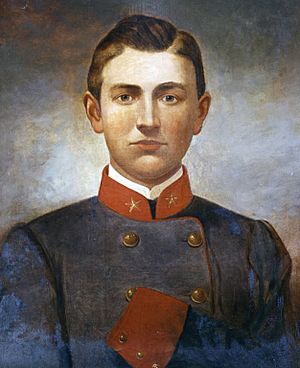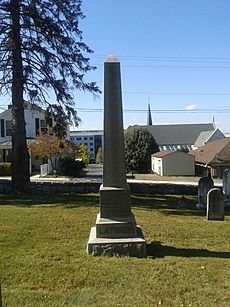Joseph W. Latimer facts for kids
Quick facts for kids
Joseph White Latimer
|
|
|---|---|

Joseph White Latimer
|
|
| Born | August 27, 1843 Oak Ridge, Prince William County, Virginia |
| Died | August 1, 1863 (aged 19) Harrisonburg, Rockingham County, Virginia |
| Buried |
Woodbine Cemetery, Harrisonburg, Rockingham County, Virginia
|
| Allegiance | |
| Service/ |
|
| Years of service | 1861–63 |
| Rank | |
| Battles/wars | American Civil War |
Joseph White Latimer (born August 27, 1843 – died August 1, 1863) was a brave young officer. People called him "The Boy Major." He served in the Confederate Army during the American Civil War. He was an expert with cannons, which is called artillery. Sadly, he was badly hurt during the Battle of Gettysburg.
Early Life
Joseph Latimer was born in Oak Ridge, Prince William County, Virginia. He went to a special school named the Virginia Military Institute (VMI). There, he learned how to use cannons and artillery. His teacher was a famous general, Stonewall Jackson.
Joining the War
The Civil War started when Joseph was in his second year at VMI. He left school to join the Confederate Army. First, he helped train soldiers in 1861. Later that year, he became a first lieutenant. He fought in battles with Richard S. Ewell's division. This was during the Shenandoah Valley Campaign in 1862.
Joseph showed great courage in battles like First Winchester and Cedar Mountain. Because of his bravery, he was promoted. In March 1863, he became a major. General Ewell called him the "Young Napoleon". But because he was so young and small, people often called him "The Boy Major."
Gettysburg Campaign
During the Battle of Stephenson's Depot, Joseph's commander was wounded. So, Joseph took charge of the artillery group for the Battle of Gettysburg.
On July 2, 1863, during the Battle of Gettysburg, Joseph was leading his cannons. They were on a small hill called Benner's Hill. His cannons were firing at the Union Army's positions. But Benner's Hill was very open and dangerous. Joseph asked if he could move his cannons to a safer spot.
He was allowed to start moving his cannons. But he went back to direct the last four guns. An exploding shell hit him. It badly wounded his arm and killed his horse. The horse fell on him, pinning him to the ground.
General Edward Johnson wrote about Joseph. He said Joseph was a "boy major" who was very brave. He noted that Joseph was severely wounded and later died from his injuries. Another officer, Captain Charles I. Raine, took over after Joseph was hurt.
Later Days
Joseph's left arm had to be removed because of his injury. He was first taken to a hospital in Winchester. But because Union troops were moving, he had to be moved again. He was taken to a family's home in Harrisonburg, Virginia.
Moving so much made it hard for him to get better. Soon, a serious infection called gangrene appeared. Joseph quickly got worse and died on August 1, 1863. He was buried in the Woodbine Cemetery in Harrisonburg. A monument marks the grave of "The Boy Major." It was placed there 51 years after his death.
 | Victor J. Glover |
 | Yvonne Cagle |
 | Jeanette Epps |
 | Bernard A. Harris Jr. |


